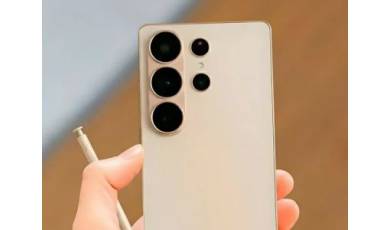Flash firmware on LG Q Stylus Plus
Mobiles >> LG >> LG Q Stylus Plus| Specifications | Reviews | Secret codes |
| Unlock phone | Root phone |
| Backup | Flash Firmware | Screenshot |
How to flash LG Q Stylus Plus?
Why reinstall the firmware?
Errors periodically appear in the Android operating system.
Some installed applications do not open.
Some applications from the Play Market do not start.
The phone restarts or shuts down randomly.
The phone started to work slowly.
You have decided to try a different version of Android.
Where can I find the firmware?
On the official website of your phone manufacturer.
On sites where users post custom or official OS.
What should be done before installing the firmware?
Create a backup copy of user data, contacts and photos and transfer it to your computer.
Insert your SD card into your phone. An SD card is needed to write firmware to it.
Find out the exact model of your smartphone.
Fully charge your device. If the battery runs out during the firmware, the device will no longer turn on.
Find and download the archive with Firmware. And place it on the SD card.
Installing TWRP Recovery
Install the Official TWRP App from the Play Store on your phone.
When you start the application for the first time, you must agree to install the firmware, as well as agree to grant the application Superuser rights and click the 'OK' button.
After moving to the next screen, you need to select the 'TWRP FLASH' item and give the application root rights.
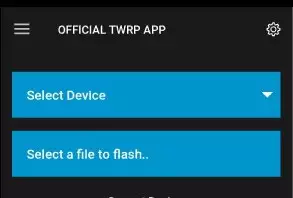
On the main screen of the application, click on the 'Select Device' drop-down list, and select your phone model.
After selecting a device, the application will direct the user to a web page to download the appropriate modified recovery environment image file. Download the suggested *.img file.
After downloading the image file, go to the main screen of the Official TWRP App and press the 'Select a file to flash' button. Then we tell the program the path where the file loaded in the previous step is located.
Press the 'FLASH TO RECOVERY' button and confirm your choice.
When the message 'Flash Completed Succsessfuly!' appears. Click 'OK'. The TWRP installation procedure is now complete.
Copy the firmware and other necessary files to the SD card.
Insert a memory card into your phone.
To reboot into recovery, you need to use a special item in the Official TWRP App menu, accessible by pressing the button with three stripes in the upper left corner of the main screen of the application. Open the menu and select the 'Reboot' item, and then click on the 'REBOOT RECOVERY' button.
Firmware via TWRP
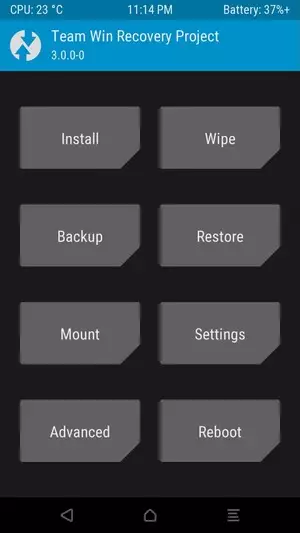
Before flashing, you need to delete all user data from the phone, this will avoid errors in the software, as well as other problems. Press 'WIPE' on the home screen.
Press the 'Install' button to start the flashing.
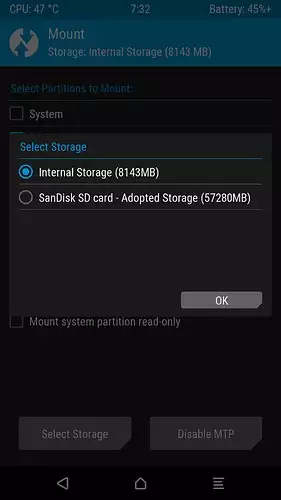
On the file selection screen, at the very top there is a 'Storage' button for selecting an SD card.
Select the location where the files were copied.
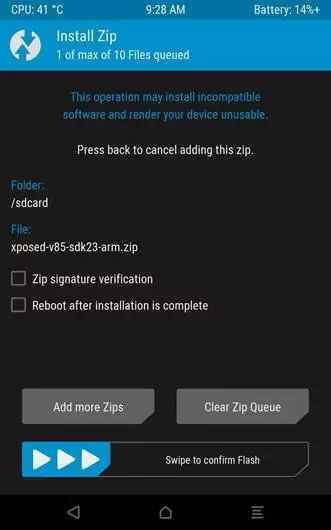
Select the firmware file and click on it. A screen opens with a warning about possible negative consequences, you need to check the item 'Zip signature verification', which will avoid using corrupted files when writing to the phone's memory sections.
The procedure for flashing the phone will begin, this is accompanied by the appearance of inscriptions in the log field and the movement of the progress bar.
After completing the installation procedure, a 'Successful' message appears on the screen.
Summary: Quick charging: Yes; Operating system: Android v8.1 (Oreo); Sim slots: Dual SIM, GSM GSM; Network: 4G: Available 3G: Available, 2G: Available; Fingerprint sensor: Yes; Display type: IPS LCD; Aspect ratio: 18: 9; Screen to body ratio: 79.74 %; Pixel density: 390 ppi; Screen size: 6.2 inches (15.75 cm); Screen resolution: 1080 x 2160 pixels; Touch screen: Yes Capacitive Touchscreen, Multi-touch; Loudspeaker: Yes; Fm radio: Yes; Audio jack: 3.5 mm; Settings: Exposure compensation, ISO control; Camera features: Digital Zoom, Auto Flash, Face detection, Touch to focus; Image resolution: 4616 x 3464 Pixels; Autofocus: Yes Phase Detection autofocus; Shooting modes: Continuos S ...
Comments, questions and answers on the flash firmware LG Q Stylus Plus
Ask a question about LG Q Stylus Plus

